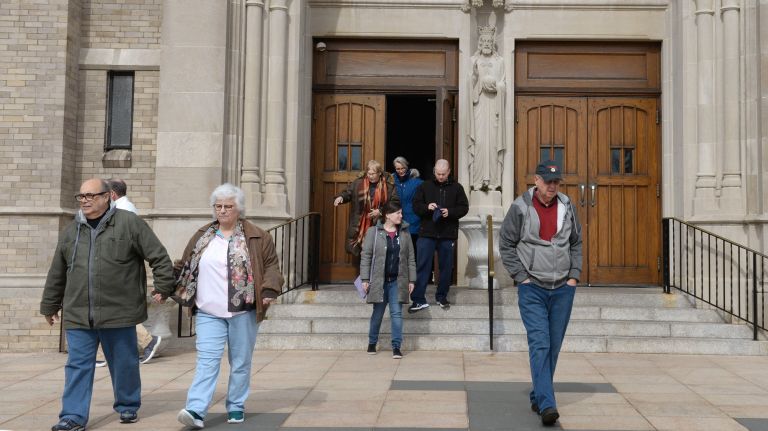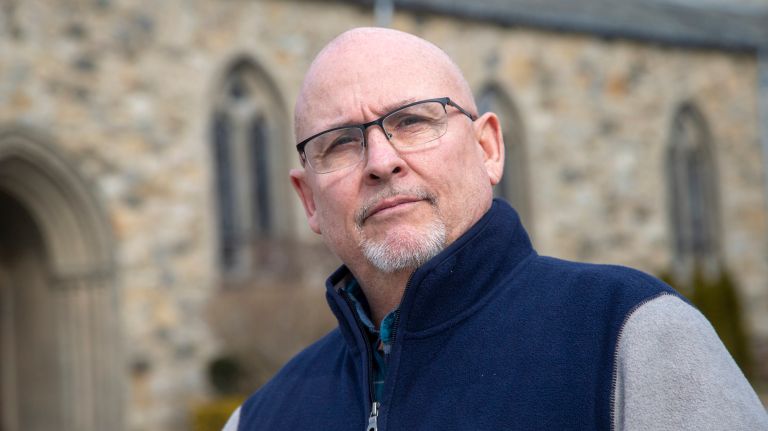Catholic Church at a "Turning Point"
By Bart Jones and Craig Schneider
Clergy sex abuse has brought the Roman Catholic Church to a pivotal moment — one that demands fundamental changes, from removing complicit bishops and ending the secrecy to ordaining women, say church analysts and a sampling of Long Island's faithful. Still, both the religious scholars and the parishioners are hopeful about the church's future. And the Long Island members are clear that they are steadfastly committed to their faith. "Yes, the church is in crisis and we're at a turning point, but … I'm a Roman Catholic. It's who I am," said James Morgo, 74, who attends Our Lady of the Snow Roman Catholic Church in Blue Point.
"The really horrendous acts were committed by flawed and sick men — not by the church," Morgo said. How quickly, and forcefully, Pope Francis addresses the scandal will determine what the church will look like, the parishioners said. For some of the faithful, the pontiff has sent encouraging signs. Others are more skeptical. Late last month, Francis closed out an unprecedented summit on clergy sex abuse by promising to confront abusive priests, stop the cover-ups by their superiors and put the victims first in what he described as a "brazen, aggressive and destructive evil." And days before the conclave, the Vatican defrocked one of the most powerful Catholic leaders in the United States, former Cardinal Theodore McCarrick, who early in his vocation served as a priest in the Archdiocese of New York. For Bishop John Barres, the spiritual leader of Morgo and the Island's other 1.5 million Catholics, the punishment of McCarrick relays a powerful message about responsibility. The New York archdiocese brought to light the first allegation against the former cardinal last summer. McCarrick's removal was “a very positive step demonstrating that he was not too important or powerful to avoid being held accountable for his conduct,” said Sean Dolan, a spokesman for the Diocese of Rockville Centre, the sixth largest in the nation. A lifelong Catholic, Eric Bauman sees McCarrick's defrocking as a move in the right direction but thinks much more needs to be done. “I’m disappointed, greatly disappointed with the hierarchy,” said Bauman, 63, a lay eucharistic minister at St. Brigid's Catholic Church in Westbury. "But I refuse to leave the church because of this. I’m not one for bulldozing down the church and starting all over again.” Grappling with crisis Nearly two decades have passed since clergy sex abuse came to the forefront of America's public consciousness with the scandal in the Archdiocese of Boston. In the wake of the Boston crisis, dioceses across the country — Rockville Centre included — agreed on a so-called zero-tolerance policy that requires any priest credibly accused of sexual abuse to be removed immediately from ministry while an investigation by law enforcement and the church is conducted, said Mark Gray of Georgetown University's Center for Applied Research in the Apostolate. The policy also requires dioceses to train all employees and volunteers to look for signs of possible abuse and report it to authorities, Gray said. "For many years now, we have had in place robust protection, education and law-enforcement-reporting protocols as part of our commitment to preventing acts of child abuse from ever occurring again … in our Church institutions," said Dolan, the spokesman for the Rockville Centre diocese. The number of allegations nationwide has dropped decade by decade, according to the center. The total stood at 6,155 for the 1970s; 3,594 for the 1980s; 777 for the 1990s; and 351 for 2000s. And the numbers keep sliding: 101 from 2010 to 2014; 18 in 2015 and 2016; and 4 in 2017, data show. Today, most of the abuse cases that surface occurred years ago, Dolan said. An example is allegations brought forward last month against the late Bishop John R. McGann, who led the Rockville Centre diocese for more than 20 years. Two unidentified women, who are now in their 60s, allege they were abused in the 1960s and 1970s when McGann was a monsignor serving St. Agnes parish in Rockville Centre, the diocese's seat. Diocese officials contacted the Nassau County district attorney's office after the women notified them. At the Vatican last month, a faction of conservative cardinals and bishops made the case that dioceses and seminaries foster clergy sex abuse through a culture of homosexuality. The faction's assertion isn't new. In 2003, a former student named William Downey sued the Rockville Centre diocese, alleging professors at the Seminary of the Immaculate Conception in Huntington promoted a pro-homosexual agenda. The lawsuit eventually fell into inactive status after the diocese transferred the professors. The lawyer who filed the lawsuit on Downey's behalf is John Picciano, himself a Catholic who still thinks seminaries are the key to preventing clergy abuse. "The best way to address and finally deal with the abuse scandal is to not only screen and vet, but weed out any seminary applicant who shows any proclivity towards sexually addictive behavior — whether gay or straight,” said Picciano, who worships at St. Kilian Roman Catholic Church in Farmingdale. And Picciano is one of the Catholics on Long Island who wants the church to act swiftly and decisively with abusive priests and bishops who cover up abuse. Zero tolerance, he said, “means just that — one and done. Any priest found to have sexually abused anyone, especially a child, and any bishop who knowingly covers up that abuse should be summarily defrocked." Another Long Island Catholic echoed Picciano's position. "Get them out of the priesthood instead of just moving them to another church, " said Mariann Nocera, 70, of Oceanside, who attended Mass one day last week at St. Agnes. "They should get them out." In an address at the end of the summit, Francis had a strong warning to bishops: "No abuse should ever be covered up (as was often the case in the past) or not taken sufficiently seriously, since the covering up of abuses favors the spread of evil and adds a further level of scandal." Nonetheless, Francis didn't detail how he plans to hold bishops accountable if they don't follow the directive. The pope's vagueness will do him a disservice, said the Rev. Thomas Reese, a Jesuit priest who is a senior analyst for Religion News Service. “No one is going to believe a system where bishops are policing other bishops,” Reese said. “Bishops and the Vatican have totally lost credibility in dealing with this issue.” Instead, Reese said, the dioceses should hand off abuse allegations to review boards that would include respected local lay leaders, such as retired prosecutors, judges, lawyers, detectives, psychologists and theology teachers. Lay Catholics, too, see a role for themselves in overseeing how dioceses investigate abuse allegations. Bishops alone, they said, shouldn't be trusted to handle the cases. If the church “does not open the doors to some lay involvement, nothing is going to change," said Bauman, the lay eucharistic minister. Pushing forward Kathleen Henken was walking past St. Agnes one day around noon, about the same time that others were heading inside for Mass. She looked at the towering brick-and-limestone edifice and thought to herself that she should be going in, too. She just couldn't, though, she said. Henken was raised Catholic. She went to Catholic schools. But her allegiance to the church, she said, has been shaken by the scandals. “I don’t think I could go to church right now,” said Henken, 74, of Rockville Centre.“ Basically, a lot of changes need to be made, a lot of doctrines need to be changed. It’s not working.” Other Catholics on Long Island are thinking along the same lines as Henken. “The future requires a deep reassessment of what the church finds important," said Richard Koubek, a parishioner at Our Lady of the Miraculous Medal Roman Catholic Church in Wyandanch. Morgo is one of those Catholics who supports ordaining women as priests and deacons, and allowing priests to marry. And many, like Nancy Steinert, mention wanting the church to be more open about the crisis. “I would prefer they were more forward and upfront,” said Steinert, 66, of Rockville Centre. “They have to advocate for the victims and advocate for the church.” Nocera, who attends St. Agnes, said: “They need to know they’re at fault, that they were wrong, and they need to get things right.” The faithful also have ideas about where the church should be pouring its energy into — social justice, immigration, young people. "Given how little Jesus preached on sexual immorality and how much he preached about justice, I think it’s time for church leaders to catch up with Christ’s priorities,” said Koubek, the Wyandanch parishioner. Patrick Hines works with young people for a living. The Valley Stream resident teaches history and religion at a Catholic school in Queens. "Young people can be open if you reach out to them,” said Hines, 51. “They are the future of the church.” Gabriel Pivaral is both young — 18 — and an immigrant. The teen and his family moved to Uniondale six months ago from Guatemala. Now, they attend St. Agnes. The church, he said, would be well served to reach out to the growing Latino community. For Pivaral, going to church is therapeutic. “I find peace for myself,” Pivaral said. “I can express myself, when it’s just me and God and my problems.”
|
.
Any original material on these pages is copyright © BishopAccountability.org 2004. Reproduce freely with attribution.

